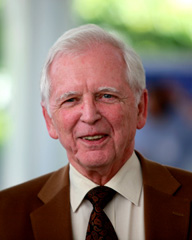Previous speakers and artists
| |
 |
|
November 26-30, 2012
Cancer prevention as a challenge for global health
Prof. Harald zur Hausen
|
|
|
Keynote Speaker
Professor Harald zur Hausen is a 2008 Nobel Laureate for Medicine at the German Cancer Research Center in Heidelberg who was awarded the Nobel Prize for his discovery that the human papillomavirus (HPV) causes cervical cancer, the second most common cancer among women.
Against the prevailing view during the 1970s, Professor zur Hausen postulated a role for HPV in cervical cancer. He assumed that the tumor cells, if they contained an oncogenic virus, should harbor viral DNA integrated into their genomes. The HPV genes promoting cell proliferation should therefore be detectable by specifically searching tumor cells for such viral DNA. Professor zur Hausen pursued this idea for over 10 years by searching for different HPV types, a search made difficult by the fact that only parts of the viral DNA were integrated into the host genome. He and his colleagues found novel HPV-DNA in cervix cancer biopsies and thus discovered the new, tumorigenic HPV16 type in 1983. In 1984 he cloned HPV16 and 18 from patients with cervical cancer. The HPV types 16 and 18 were consistently found in about 70% of cervical cancer biopsies throughout the world.
The global public health burden attributable to human papilloma viruses is considerable. More than 5% of all cancers worldwide are caused by persistent infection with this virus. Infection by the human papilloma virus is the most common sexually transmitted agent, afflicting 50-80% of the population. Of the more than 100 HPV types known, about 40 infect the genital tract, and 15 of these put women at high risk for cervical cancer. In addition, HPV is found in some vulval, penile, oral and other cancers. Human papilloma virus can be detected in 99.7% of women with histologically confirmed cervical cancer, affecting some 500,000 women per year, most of them in developing countries.
Professor zur Hausen demonstrated novel properties of HPV that have led to an understanding of mechanisms for papilloma virus-induced carcinogenesis and the predisposing factors for viral persistence and cellular transformation. He made HPV16 and 18 available to the scientific community, and vaccines were ultimately developed that provide ≥95 % protection from infection by the high risk HPV16 and 18 types. The vaccines also reduce the need for surgery and the global burden of cervical cancer.
Harald zur Hausen received his Doctor of Medicine degree in 1960 from the University of Düsseldorf where he then worked at its Institute of Medical Microbiology. He moved to the Virus Laboratories at the Children's Hospital in Philadelphia and habilitated at the University of Würzburg in 1969. In 1972 he accepted the chair of Clinical Virology at the University of Erlangen-Nürnberg, and in 1977 he moved on to the University of Freiburg where he became the chair of the Department of Virology and Hygiene. From 1983 until 2003 Professor zur Hausen served as Chairman and Scientific Director of the German Cancer Research Centre (DKFZ) in Heidelberg. Under his leadership the DKFZ expanded its collaboration with university hospitals. Clinical cooperation units now ensure close contact between basic research and clinical medicine so as to ensure the swift transfer of research results into practical applications.
Among national and international awards Professor zur Hausen received are the Robert Koch Prize, the Charles S. Mott Prize of the General Motors Cancer Research Foundation, the Federation of the European Cancer Societies Clinical Research Award, the Paul Ehrlich Ludwig Darmstädter Prize, the Jung Prize, the Charles Rudolphe Brupbacher Prize, the Prince Mahidol Award, the Raymond Bourgine Award, the Coley Award and the Life Science Achievement Award of the American Association for Cancer Research. He received honorary doctorates from 21 international universities.
Professor zur Hausen is an elected member of various academies including LEOPOLDINA, the Academia Europaea, the Heidelberg Academy of Sciences, the Polish Academy of Sciences, the Venezuela National Academy of Medicine, the American Philosophical Society, the US National Academy of Sciences and the Institute of Medicine of the US National Academy of Sciences.
From 2006-2010 he was a Member of the Board of Directors of the International Union against Cancer (UICC), and since 2006 he has been a Member of the National Science Transfer and Development Agency in Bangkok.
SCHEDULE
Monday, November 26, 2012
10:00 Dialogue with high school students at the International School of Bangkok (Thailand) (not a public event)
13:00 Dialogue with high school students at the NIST International School (Thailand) (not a public event)
Wednesday, November 28, 2012
10:30 Dialogue with lecturers and students at the University of Medicine and Pharmacy in Ho Chi Minh City (Vietnam) (not a public event)
14:00 Keynote speech and dialogue at the Vietnam National University (in cooperation with the University of Medicine and Pharmacy and Nong Lam University) in Ho Chi Minh City (Vietnam)
Information and free seat reservation:
phone (090) 816-9593, email dophuc@vnuhcmc.edu.vn
Friday, November 30, 2012
14:00 Keynote speech and dialogue at the Hanoi Medical University in Hanoi (Vietnam)
Information and seat reservation:
phone (0913) 546-992, email haphanhaian@hmu.edu.vn
|
|